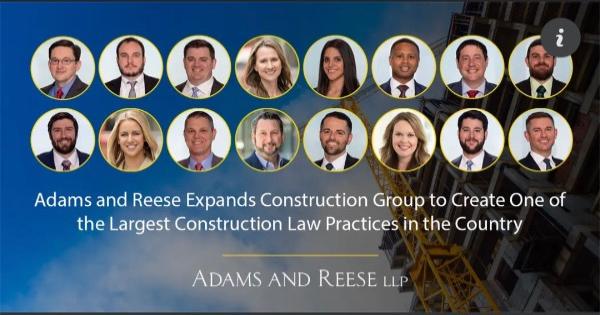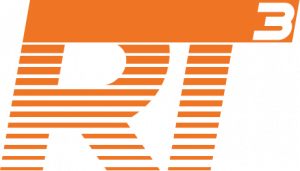This expansion creates one of the largest construction law practices in the country.

Adams and Reese LLP is pleased to announce the expansion of its nationally ranked construction practice with the combination of Tampa, Florida-based Cotney Construction Law LLP, a full-service legal and consulting firm serving the construction and infrastructure industries with 16 attorneys and professionals located across the United States. These additions join Adams and Reese’s current roster of 58 construction attorneys and takes the group to 75, now one of the largest construction practices in the country. The combination strengthens Adams and Reese’s capabilities in high-stakes commercial disputes and transactions. The combined practice now boasts eight Florida Bar board-certified construction lawyers, as well as two Florida certified general contractors.
The complete list of attorneys joining Adams and Reese today includes:
Trent Cotney
Tray Batcher
Benjamin Briggs
Christie Coston
Jacqueline Feliciano
Roscoe Green
Brian Lambert
Benjamin Lute
Steven McCommon
Hilary Morgan
Brian Oblow
Gabriel Pinilla
Mason Pokorny
Ashlee Poplin
Kyle Rea
Lee Tomlinson
“Our construction practice is a driver for the firm, and client needs are fueling its growth. Our strategic plan calls for doubling down on existing areas of strength,” said Gif Thornton, managing partner of Adams and Reese. “Trent and the Cotney team are national leaders in the construction law space, and their capabilities complement ours. This combination moves us toward dominance nationally and in the Southeast in particular, coinciding with the economic growth in the region.”
The team joining Adams and Reese brings a wealth of knowledge and experience in serving publicly traded companies, private businesses and individuals in transactions and disputes nationally and internationally. Their singular focus is meeting an array of legal, business and consulting needs in the construction space, as evidenced by national rankings by Chambers USA, Construction Executive, Construction Tech Review, Finance Monthly, Forbes and U.S. News & World Report, among others.
“We are excited about this opportunity to add our already deep bench to a national firm like Adams and Reese, whose resources and platform will take us to the next level,” said Trent Cotney, who served as chief executive officer of his firm and now becomes a partner at Adams and Reese. “As advocates for construction clients in the U.S. and around the world, our combined team has a deep understanding of what we must bring to bear when providing the most comprehensive counsel to our clients, and we can better meet their needs through our collective strengths. Our team shares Adams and Reese’s forward-thinking vision and commitment to diversity, which will exponentially grow our combined capabilities.”
The new team of attorneys relocates to Adams and Reese’s downtown Tampa office, located at 100 N. Tampa Street, Suite 4000.
“Every major city nationwide is seeing dramatic changes to its skyline, and the country is ripe with new construction and infrastructure projects that require the experience of trained construction lawyers,” said David Toney, leader of Adams and Reese’s Construction Team and a member of the firm’s Executive Committee. “This combination gives us the horsepower to respond to that need both now and into the future.”
“As the complexity of business challenges increases in response to a more interconnected global economy, our clients are seeking sophisticated advice at national and international levels,” said Jeffrey Brooks, chair of the Executive Committee at Adams and Reese. “The successful combination with Cotney will serve as a platform for our continued growth, as well as an exemplar of the partnership we seek in that mission.”
Adams and Reese, founded in 1951, is a multidisciplinary law firm with over 270 attorneys and advisors strategically located throughout the United States and Washington, D.C. The American Lawyer includes Adams and Reese on its distinguished list of the nation’s top law firms, the Am Law 200. The National Law Journal also includes the firm among the top 200 on the NLJ 500 list of the nation’s largest law firms. Learn more at www.adamsandreese.com.

